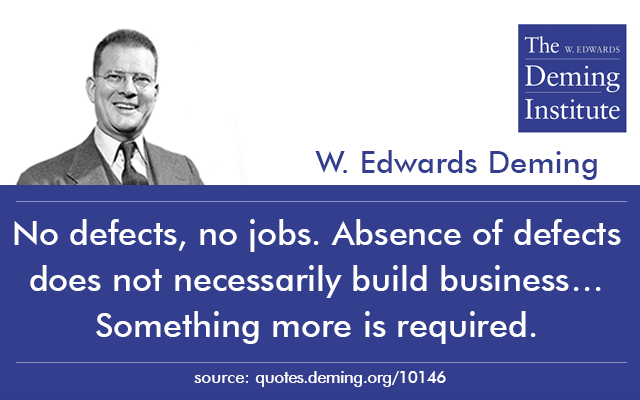Zero Defects by Norman Bodek:
Do you believe it is possible to have Zero Defects? I am not talking about six sigma at all.
I believe it is possible to have zero defects (in a sense). But I do not believe it is a good management strategy to practice what those I have heard in the past preaching zero defects.
A Dichotomy by Norman Bodek. Wow, you really have to look to find this article after you follow the link [I removed the link – additional site defect is now a completely broken link, violating basic 1998 guidance that web links must live forever]. I think the site could really benefit from improving the usability of the site (similar to lean ideas on making things visible and easy to find):
In truth, you should be making lots of mistakes. We do want you to learn, but for the sake of your customers you should not allow mistakes to become defects. That is the dichotomy! Make mistakes but don’t allow them to become defects.
I know many people talk about this conflict (aiming for zero mistakes means missing the most important ideas – because they might be risky). However, I have never really understood it as a conflict. You want to take risks to try new things to experiment to learn. Doing those things can be done in a manner that doesn’t provide your customers a defect. I suppose there are times when you take a risk your customers may be disappointed, but I don’t see why this need be the case with most experiments.
Aiming to limit defects for the customer is a good idea. I agree continually improving your products and service is a good idea. I think applying poka yoke concepts is a great idea to eliminating mistakes internally (in your organization) and in the design of your products and service so your customers avoid potential problems.
I agree that eliminating defects that get to customers (and even those that don’t) is wise. But I think that doing so is the result of continually improving your processes. I do not believe you succeed by declaring your goal to be zero defects. You succeed by creating a culture of never ending improvement, of customer focus, of fact based decision making, of learning, of “empowerment”…
Part of that improvement is reducing variation, reducing defects, implementing smart new mistake proofing but innovation is too. Effectively zero defects is not really achievable in most cases. Defects are largely a matter of definition. As performance improves expectations will often rise. When you eliminate anything you would have called a defect years ago, standards are higher and things that would not have been called defects are no longer acceptable. At some point the system process advances to such a level where zero defects is possible in some cases but in many (say medical care, air transportation, education, computer software, restaurants, government, management consulting, civil engineering, legal services…) I really think it is basically impossible.
W. Edwards Deming, New Economics, page 10: “No defects, no jobs. Absence of defects does not necessarily build business… Something more is required.”



I think you’re over-thinking zero defects. In my view it doesn’t prevent or slow down innovation; it’s simply the idea of doing work right. There is always a left and a right to every subject, zero defects belongs right in the middle; it’s just not that complicated. As the title of my book “The Zero Defects Option” suggests, zero defects is the leaders option.
Dave Crosby – I tend to agree with you. John Hunter – I tend to agree with you too. Is that logically possible? I believe it is. I’m a disciple of TQM. Yet, I’ve seen what I call zero-defect phonies. They make me glorious claims that include, among other mechanisms, creative redefining of the word ‘defect’. I like your points about a culture of continuous improvement John. But Dave’s point is very well-said, also. Would love to round-table with you guys sometime.